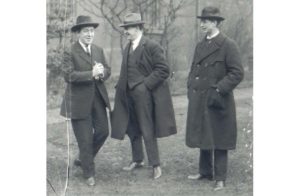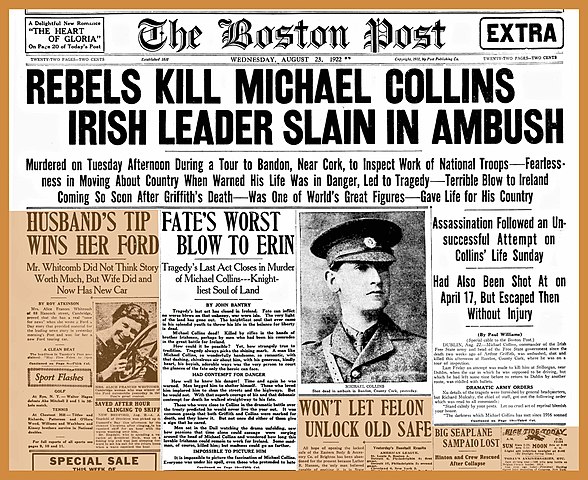There is no question that if Michael Collins had not died, Irish history would have been changed utterly.
100 years ago, on the 22nd of August, 1922, on a lonely road outside Cork City, the general commander of the Irish Army, Michael Collins, was shot dead in an ambush by IRA forces. He died in his home county, among his own people, with his dream of Irish unity unfinished and undone.
Now, 100 years later, a new investigative program into how Collins was actually killed has been announced by RTÉ titled “Cold Case Collins.” Led by former state pathologist Dr. Marie Cassidy, backed up by a large group of medical and army personnel, it is an extraordinary thing to contemplate, that one century later, one of the most enduring questions in Irish history still looms – who killed Michael Collins?
His death was a disaster. He was about to end the Irish Civil War when he undertook the trip to Cork from Dublin that led to his death.

Collins had consulted with senior figures on both sides, with the exception of Éamon de Valera, who had kicked off the war by refusing to accept the treaty which gave 26 counties to the Irish Free State, while six counties remained in Northern Ireland.
Despite the people voting in a free and fair election for the Collins plan to accept what was on offer from the British, and deal with the issue of Northern Ireland later, de Valera still refused to accept the treaty.
There is no question that if Collins had not died, Irish history would have been changed utterly.
He was a remarkable leader. Only 32 when he was assassinated by persons unknown, it would have been Collins, and not de Valera, who dominated the Irish political scene well into the 20th century.
The British had been very careful in who they executed after the 1916 Easter Rising. Killing the top layer of leadership such as James Connolly and Patrick Pearse, and leaving the country in the hands of de Valera, a man whose flawed thinking and deep ability to bear a grudge would bedevil Irish politics, was a clever move by the British.
There was also the fact that de Valera’s right-wing Catholicism, and his complete embrace of the Catholic Church, proved disastrous for Ireland well into the 20th century. Indeed, its impact is still felt today.
Collins was not that kind of man. He would have never fought the Civil War if the treaty had been defeated.
In fact, it is likely he would have brought both sides together and avoided the vicious war that tore Ireland apart.
We can only wonder what JFK would have achieved for America, or his brother Robert, or Martin Luther King, if they had been allowed to live. It is safe to say that the United States would have been a far better place with those men in leadership positions.
Such is the case with Collins, the greatest leader Ireland had ever produced. His killing at the age of 32 was a catastrophic event for a very young free state desperately reaching for republic status free of Britain.
100 years later, the fact that a new inquiry into Collins’ death will take place indicates just how incredibly deep his memory runs in the hearts and minds of the Irish. Suffice it to say that we will never see the likes of him again. His death will be forever marked as a turning point in Irish history. ♦
Read more about Michael Collins from Irish America.


Niall, great article, totally agree with every word you wrote, indeed I often dream of how the history of Ireland would have changed if Michael Collins had lived, My two greatest heroes were both assassinated
Michael Collins and John Fitzgereld Kennedy
Without Collins, we wouldn’t even have 26 counties. I believe we would still be under British rule if Collins had not died. I believe we would’ve had a united Ireland by now